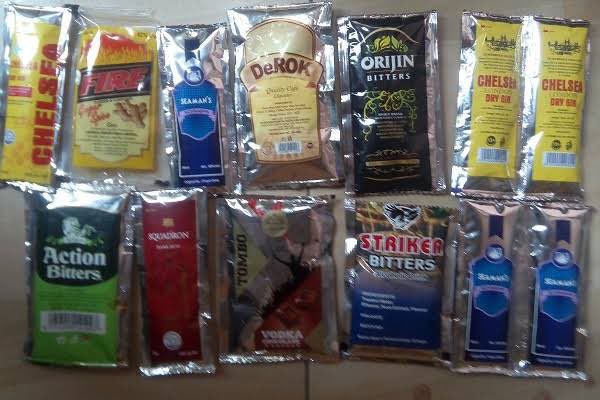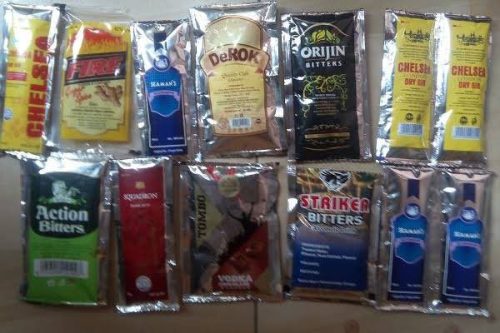NATIONAL NEWS
FG Bans Sachet Alcohol, Vows to Enforce Action
To curb alcohol abuse, the federal government has banned the importation, manufacture, distribution, sale, and use of alcoholic beverages in sachets, PET, and glass bottles of 200 ml and below.

To curb alcohol abuse, the federal government has banned the importation, manufacture, distribution, sale, and use of alcoholic beverages in sachets, PET, and glass bottles of 200 ml and below.
This was made known by the Director-General of the National Agency for Food and Drug Administration and Control (NAFDAC), Prof Mojisola Adeyeye, on Monday at a press conference in Abuja after a high-powered delegation that consisted of the Federal Ministry of Health, NAFDAC, and other relevant agencies and was taken in the best interest of the country.
The agency made it clear that the January 31st deadline it gave has elapsed and so, will enforce action on sellers.
“As of January 31, 2024, there is no alcoholic beverage in these categories that are registered by NAFDAC. I also want to inform you that the agency has started enforcement actions to enforce the implementation of this policy. The window period given to manufacturers by NAFDAC to sell off all alcoholic drinks in this category elapsed on January 31, 2024.
“To this end on the first day, after the elapse of the window period, the agency commenced nationwide enforcement actions on February 1, 2024, to enforce the implementation of the new policy.
“This situation is of course not acceptable, and the agency views this as flagrant disobedience to the laws of Nigeria. NAFDAC views this matter seriously and will engage all statutory means, which may include prosecution, to deal with the matter.

“I want to use this medium to ask all holders of alcohol in sachets, PET and glass bottles, empty sachets, PET bottles, empty glass bottles, and other packaging materials of these banned products to immediately report to the Investigation and Enforcement Directorate of NAFDAC for hand-over of same to NAFDAC for destruction, to prevent sterner measures including prosecution.”
“This decision was based on the recommendation of a high-powered committee of the Federal Ministry of Health and NAFDAC on one hand, the Federal Competition and Consumer Protection Commission (FCCPC), and the Industry represented by the Association of Food, Beverages and Tobacco Employers (AFBTE), Distillers and Blenders Association of Nigeria (DIBAN), in December 2018.
“As a commitment to the decision reached at the end of this Committee meeting, producers of alcohol in sachets and small volume agreed to reduce the production by 5 percent with effect from 31st January 2022 while ensuring the product is completely phased out in the country by 31st January 2024”.
“The people who are mostly at risk of the negative effect of consumption of the banned pack sizes of alcoholic beverages are the under-aged and commercial vehicle drivers and riders.
“The World Health Organization has established that children who drink alcohol are more likely to: use drugs, get bad grades, suffer injury or death, engage in risky sexual activity, make bad decisions, and have health problems.
“The World Health Organization also stated that harmful consumption of alcohol is linked to more than 200 health conditions including infectious diseases (tuberculosis and HIV/AIDS) and non-communicable conditions (liver cirrhosis and different types of cancer).
“It is also associated with social problems such as alcohol addiction and gender-based violence.
“To curb the menace of abuse of alcohol, the World Health Organization recommended some actions and strategies to Policy-Makers that have shown to be effective and cost-effective, which include: regulating the marketing of alcoholic beverages (in particular to younger people) and regulating and restricting the availability of alcohol.”
For publication of your news content, articles, videos or any other news worthy materials, please send to newsleverage1@gmail.com. For more enquiry, please call +234-706-806-4347 or whatsapp +234-706-806-4347. To place an advert, please call 07068064347.
-

 METRO2 weeks ago
METRO2 weeks agoDebtors Rejoice Over Death of Popular Money Lender, ‘Old Warri’
-

 CRIME4 weeks ago
CRIME4 weeks agoPolice Crack Down on IPOB/ESN, Kidnapping Gangs, Arrest Over 2,700 Suspects
-

 NATIONAL NEWS1 week ago
NATIONAL NEWS1 week agoAdeyanju Reveals Who Funds Atiku’s Presidential Bid
-

 Abia State News3 weeks ago
Abia State News3 weeks agoEze Eberechukwu Oji Establishes Four Development Committees
-

 CRIME3 weeks ago
CRIME3 weeks agoPregnant Nurse Allegedly Murdered for Ritual in Anambra

